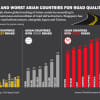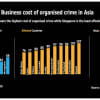Energy Transition Index: Bangladesh 90th among 115 nations
Bangladesh has ranked 90th on the global Energy Transition Index (ETI), which has benchmarked 115 countries on how well they are able to balance energy security and access with environmental sustainability and affordability.
Last year, Bangladesh ranked the same position but that time 114 countries were included in the index.
The report titled “Fostering Effective Energy Transition” published by Geneva-based World Economic Forum (WEF) on Monday contains the ETI which compares the energy sectors of 115 countries and analyses their readiness for energy transition.
According to the report, Sri Lanka has come first among the South Asian countries, ranking 60th, while India secured 76th position. Pakistan has ranked 97th and Nepal 93rd.
Praising Bangladesh's effort on electrification, the report said, “Bangladesh made fast progress towards universal electrification due to strong political commitment, a stable policy regime, use of grid expansion and decentralised generation sources, and a supportive environment for investment in infrastructure.”
While Bangladesh has scored low in terms of transition readiness, it ranks considerably higher when it comes to system performance.
The “transition readiness” component of the index has taken into account six individual indicators: capital and investment, regulation and political commitment, institutions and governance, institutions and innovative business environment, human capital and consumer participation, and energy system structure.
Energy system performance measures the ability of countries' current energy architecture to deliver across the three imperatives of the energy triangle: economic development and growth, energy security and access, and environmental sustainability.
According to the index, Sweden remains on the top on this annual list followed by Switzerland and Norway.
The index considers both the current state of the countries' energy system and their structural readiness to adapt to future energy needs.
The WEF said despite the climate pact signed in Paris three years ago, the world's energy systems have become less affordable and are no more environmentally sustainable than they were five years ago.
Limiting global warming depends on a rapid transition from fossil fuels to more sustainable energy sources. Yet many countries continue to rely on coal-fired power to meet rising demand for energy.
The biggest challenge facing attempts to future proof global energy is the lack of readiness among the world's largest emitters. The 10 countries that score the highest in terms of readiness accounted for a mere 2.6 percent of global annual emissions, the study found.
“The world's transition to secure, affordable and sustainable energy has stagnated, with little or no progress achieved in the past five years,” it said.
Contacted, Nasrul Hamid, state minister for power, energy and mineral resources, told The Daily Star that the country was still lagging behind reaching the baseload power, the amount of power available to meet fundamental demands by consumers.
“We have undertaken different projects like Rooppur Nuclear Power Plant, Matarbari Coal Power Plant and Payra Thermal Power Plant. We hope that we will reach a sustainable position by 2024,” he said.

 For all latest news, follow The Daily Star's Google News channel.
For all latest news, follow The Daily Star's Google News channel. 








Comments